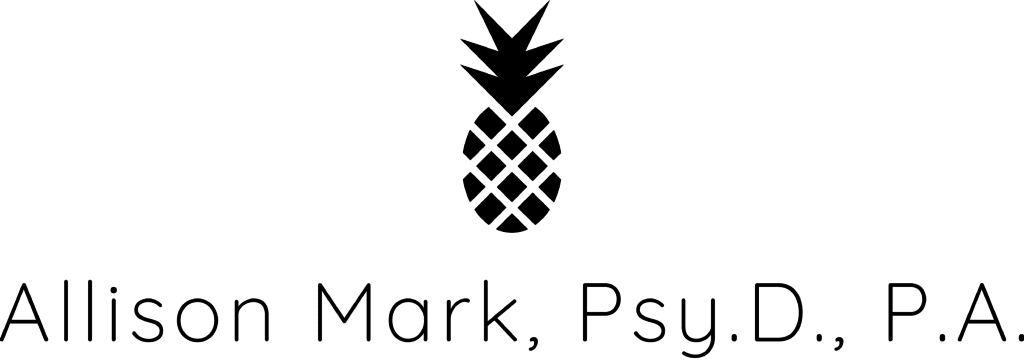Disclosure: This post is written & sponsored by Licensed Clinical Psychologist, Allison Mark, PsyD, PA. It’s officially “Back to School” time which comes with many questions about assessments for your children. Dr. Allison Mark is here to put your minds at ease and provide you with a Mother’s unique perspective on this subject.

Who Am I?
I’m Allison, a clinical psychologist and mother of two. (Did I mention they are 2 years old and under?) I am navigating the trials and tribulations of motherhood in Miami and building a private practice. I know first hand how fulfilling and challenging it is to be a mom. Not only a mom, but a mom who works while also wanting the absolute best for her children and desiring to spend time with them. I am a mother who has a unique perspective on the importance of psychological testing for our children. It is so important to do our research when we believe that they may be struggling: emotionally, academically or both.
My thoughts as a Mother and a Psychologist…
As a mother, if I were told by my child’s school that he needed to be evaluated, of course, this might be upsetting news to hear. No mother wants her child to struggle in school or at home. Being told that your child needs to be evaluated can feel very daunting and somewhat intrusive. Nevertheless, as a Psychologist, I can tell you that it does not need to feel this way.
If you are reading this, you are probably an outstanding Mom who cares deeply for the needs of her child. You would do anything to get your child the help that they need! My aim is to provide you with information that will help remove any fears associated with evaluations. I want to help make the process easier for you and your child.
 I conduct assessments typically referred to as psychological, psycho-educational or neuropsychological assessments. School counselors may encourage you to get your child a particular assessment. These words are often used interchangeably. Therefore, it is important for you moms out there to understand the differences so that you can navigate the best option for your child.
I conduct assessments typically referred to as psychological, psycho-educational or neuropsychological assessments. School counselors may encourage you to get your child a particular assessment. These words are often used interchangeably. Therefore, it is important for you moms out there to understand the differences so that you can navigate the best option for your child.
Most psychologists who conduct assessments do all of them. Don’t be alarmed if you go to my website and see psychoeducational or neuropsychological assessments and think, “Ugh, she does not do the kind of assessment the counselor wants.” I actually do all of the above!
The terms “assessment,” “evaluation,” and “testing” are also used interchangeably. While it can be confusing, don’t be intimidated Mama, we are here to help!
What’s the difference between these fancy named assessments?
- A Psychological Assessment can assess intelligence and academic achievement. Psychological evaluations add a social, emotional and behavioral component as well.
- Psychoeducational Evaluations seek to understand a child’s general learning style. These evaluations can guide the development of classroom accommodations and supports from an educational perspective.
These evaluations are generally not as broad as neuropsychological evaluations (the most comprehensive of them all). They usually do not include formal assessments of the specific domains of cognitive functioning (attention, memory, executive functioning, language, etc). If your child’s school wants your child’s attention and executive functioning to be further assessed, you want to make this clear to the psychologist so they can administer more tests in the assessment.
- Neuropsychological Evaluations examine how a child’s brain functions and how that functioning impacts the child’s behavior and learning.
These evaluations are the most comprehensive of all. Neuropsychological evaluations are typically much broader than Psychological or Psychoeducational evaluations. These evaluations usually take longer to administer. They are also much more expensive but for a VERY good reason.
Neuropsychological evaluations typically include assessments of intelligence and academic achievement. They can even include assessments of the specific domains of cognitive functioning such as:
- executive functioning,
- visual-perceptual abilities,
- information processing,
- attention and concentration,
- learning and memory,
- language,
- adaptive skills,
- and fine motor skills.
By examining a child’s underlying neurocognitive processes in greater detail, this type of evaluation can provide deeper insight into:
- why students are having certain difficulties
- their learning strengths and weaknesses
- effective interventions to address their difficulties both in and outside of school
So why are these assessments so important?
 Has your car ever broken down for no apparent reason? You (or maybe your husband!) looked under the hood to check the engine to see how it’s running. You probably have even taken your car into the shop to get it assessed to see what’s malfunctioning. You maybe even spent a hefty load of money so that you could get it back up and running smoothly again.
Has your car ever broken down for no apparent reason? You (or maybe your husband!) looked under the hood to check the engine to see how it’s running. You probably have even taken your car into the shop to get it assessed to see what’s malfunctioning. You maybe even spent a hefty load of money so that you could get it back up and running smoothly again.
Think of an assessment like this. We are looking under the “hood” of your child or teen to further examine what works well. Assessments provide us with information about what might need some tweaks, adjustments or improvements in order to optimize functioning and provide a smoother ride. If you can invest in your car you can invest in your child, am I right?
Assessments help to identify specific strengths and weaknesses to help your child or teen learn at their best, most individualized, pace. Also, assessments look at the WHOLE child or teen. For example, if a teacher is seeing attention problems in school the psychologist will assess for things like ADHD. However, ADHD is not always the cause of attention problems. Did you know that ADHD symptoms can actually be something else like depression, anxiety, or even learning difficulties?
How much does something like this cost?
 Most private practice providers do not accept insurance. This is because insurance minimally reimburses for these assessments (I’m being super honest with you Mom). If you do find someone that takes insurance I can predict with 95% confidence that you will be waiting for your appointment for quite some time because these providers are hot commodities.
Most private practice providers do not accept insurance. This is because insurance minimally reimburses for these assessments (I’m being super honest with you Mom). If you do find someone that takes insurance I can predict with 95% confidence that you will be waiting for your appointment for quite some time because these providers are hot commodities.
Many psychologists in private practice who do not take insurance will provide their clients with what is called a “super bill.” This is an itemized form used by healthcare providers to reflect rendered services. You can send the super bill to your insurance provider to see if they will reimburse you for some of the assessment.
Assessments can cost anywhere from $1500 up to $3600. Most private practice psychologists in Miami will charge between $180-$250 per hour for their time. Some have a flat rate for assessments and others charge by the hour.
The assessment typically takes anywhere between 12-18 hours. It sounds like a lot of hours but this includes the following:
- Clinical interview with you
- Test administration with your child (depending on the type of assessment can take 4 – 8+ hours)
- Scoring and interpreting the test scores
- Writing up the report
- Final feedback session During this session, you and the psychologist review the test results, go over the report, and discuss follow up recommendations for the teachers and you to implement at school and at home.
The more comprehensive the assessment the more time intensive the process. Therefore, the more expensive the assessment becomes.
Let’s return to the car example – if your car needs attention, how much are you willing to pay to improve its functioning? This is worth it!
How do I go about getting my child assessed?
First of all, you are the parent so you know your child the best. If you feel that your child is struggling you do NOT need to wait for someone to suggest to you to get him/her assessed. You do NOT need a referral!
Let’s say you have decided on your own or have been referred by your child’s school – what’s next? Several things can happen:
- If you are referred by the school they may have you see their school psychologist. Keep in mind that a school psychologist cannot typically do a full comprehensive neuropsychological assessment. You need to go to a clinical psychologist or neuropsychologist for a full comprehensive assessment.
- Your child’s school may suggest some pre-identified psychologists.
- PsychologyToday.com is a good resource to find providers to conduct an assessment or to find a therapist for yourself or your child.
- Ask your pediatrician for a referral.
- Come visit me!
I’m happy to serve families in the Miami area at my private practice. Connect with me on Instagram or visit my website to learn more about how we can work together to meet your child’s needs.
Has your family struggled with learning differences?
Share your own tips in the comments!
Dr. Allison Mark
Allison Mark is a licensed clinical psychologist with extensive experience working with children, adolescents, adults and families. She received her Masters in Educational Psychology at New York University and earned her doctorate in Clinical Psychology with a specialization in children and adolescents from The Chicago School of Professional Psychology. She specializes in Individual Therapy as well as conducting Gifted Assessments and Neuropsychological Assessments to evaluate for ADHD and learning differences. Allison worked in a hospital and a private practice in New York before transplanting to Miami in March of 2018 with her husband and two boys. She has a private practice in South Miami where she provides a warm and confidential environment, helping clients feel comfortable during evaluations or the therapeutic process. Contact Dr. Allison Mark for more information or to schedule a consultation.


















My children are still very young and reading about this in advance makes me feel informed and prepared for the future. I have heard stories from other moms feeling overwhelmed and worried when teachers recommend these types of assessments, but as you said, it doesn’t have to be/feel that way. Thanks for your guidance on such a sensitive/important matter!
Comments are closed.